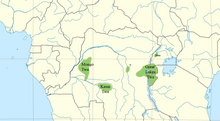Mongo Twa

The 14,000
Hunting is easiest for the Twa in the rainy season, the period of seasonal hunger, as the flooded rivers force game to high ground near the villages, which are separated from each other by the marshes. They exchange the game for cassava, palm oil, iron, and pottery. Unlike the situation further south, it is the patron Oto who do the fishing. The Twa were as of the late 1970s being forced to settle, as their foraging territory was being cleared for farming (Pagezy).
As of the late 20th-century there was little mixing between the castes. On the rare occasion that an Oto man has a child with a Twa woman, the child is raised as Twa. This is in contrast to the
Normally the name "Twa" is used alone, but when disambiguation is required, these people may be called the Mongo Twa, Konda Twa, Lia Twa, Ntomba Twa.[4]
Notes
- Ntomba-languagespeakers, who live around the lake, though dialects of Mongo proper are also called Ntomba
- Liaare possibly dialects
- ^ Konda may also be divergent enough to be considered a distinct language.
- ^ Pujol & Laurens, 1975. L'Homme et l'animal: premier Colloque d'ethnozoologie, p 63;
Hiernaux, p 202
References
- Hiernaux, Jean. 1977. "Adaptation of the African to the rain forest", in Harrison (ed.) Population Structure and Human Variation
- Pagezy, H. 1988. "Coping with uncertainty in food supply among the Oto and Twa living in the equatorial flooded forest near Lake Tumba, Zaire." In de Garine & Harrison (eds.), Coping with Uncertainty in Food Supply, pp 175–209. Clarendon.
See also
- Twa peoples
- Classification of Pygmy languages
